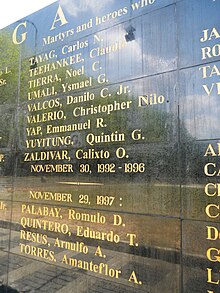| The HonorableCalixto O. Zaldivar | |
|---|---|
 | |
| 75th Associate Justice of the Supreme Court of the Philippines | |
| In office September 12, 1964 – September 13, 1974 | |
| Appointed by | Diosdado Macapagal |
| Preceded by | Alejo Labrador |
| Succeeded by | Hermogenes Concepcion Jr. |
| Governor of Antique | |
| In office December 30, 1951 – December 30, 1955 | |
| Preceded by | Tobias Fornier |
| Succeeded by | Josue Lacson Cadiao |
| Member of the National Assembly from Antique's lone district Member of the House of Representatives of the Philippine Islands (1934–1935) | |
| In office June 5, 1934 – December 30, 1941 | |
| Preceded by | Segundo C. Moscoso |
| Succeeded by | Alberto A. Villavert Tobias Fornier (ex officio) |
| Municipal Councilor of Pandan, Antique | |
| In office 1928–1931 | |
| Personal details | |
| Born | Calixto Oirola Zaldivar (1904-09-13)September 13, 1904 Pandan, Antique, Philippine Islands |
| Died | October 13, 1979(1979-10-13) (aged 75) |
| Political party | Nacionalista |
| Spouse | Elena Torres Ang |
| Children | 5 (including Salvacion Z. Perez) |
| Alma mater | University of the Philippines |
| Profession | Lawyer |
Calixto Oirola Zaldivar (September 13, 1904 – October 13, 1979) was a Filipino lawyer and politician who was a Supreme Court Justice from 1964 to 1974 best known in Philippine history for being one of only four dissenting voices against the constitutionality of the Philippines' 1973 constitution in the 1973 case known as Javellana v. Executive Secretary, despite pressure by the authoritarian government of Ferdinand Marcos to vote in the constitution's favor.
He is honored by having his name inscribed on the wall of remembrance at the Philippines' Bantayog ng mga Bayani, which honors "the heroes and martyrs who fought against the Marcos dictatorship."
Early life and education
Zaldivar was born in Pandan, Antique, to Pedro Telmo Gella Zaldivar, a former Justice of the Peace in Pandan, and Manuela Palacios Ledesma of Culasi. He later was adopted by his father's sister Salvacion and her husband Enrique Gella Oirola (who was also his father's cousin). According to his descendants, he retained his original surname then used the adoptive (Oirola) as his middle name, in honor of his foster parents. He graduated in law from the University of the Philippines in 1928 and was the third placer in that year's bar examination.
Career
Zaldivar's career in Philippine government was unusual in that he held positions in all branches of the government. In the Legislative, he was elected as a municipal councilor of Pandan from 1928 to 1934 and served as a Representative of Antique from 1934 to 1941; in the Executive branch, as Governor of Antique from 1951 to 1955 and as assistant and then acting Executive Secretary of President Diosdado Macapagal in 1964; and in the judiciary, as Associate Justice of the Supreme Court from 1964 to 1974.
Dissenting opinion against Martial Law
Main article: Ratification Cases
Zaldivar, along with Chief Justice Roberto Concepcion, were the dissenting voices during the deliberations on the issues arising out of the declaration of the Martial Law and the validity of the 1973 Constitution. They argued that the 1973 Constitution was not in force and effect because it was not validly ratified by the Filipino people. Despite pressure to agree to a ruling that would legitimize the Martial law government of Ferdinand Marcos and his ideology of constitutional authoritarianism, Zaldivar and Concepcion persisted in their dissent.
His positions as part of the Philippine Supreme Court emphasized civil and political liberties at a time when their value was being questioned, and he was known for being a proponent of the social sciences, religion, law, government, and statesmanship.
References
- ^ "HEROES & MARTYRS: ZALDIVAR, Calixto O." Bantayog ng mga Bayani. 2016-04-11. Retrieved 2019-10-29."HEROES & MARTYRS: ZALDIVAR, Calixto O." Bantayog ng mga Bayani. 2016-04-11. Retrieved 2019-10-29.
- Hofmann, Sofie Estolloso (2009-10-04). "Antiqueños commemorate 30th death anniversary of Justice Calixto Zaldivar". Pandan.Ph. Archived from the original on 2009-10-27. Retrieved 2019-10-29.
- "MW Calixto O. Zaldivar". Retrieved November 8, 2022.
- "Associate Justice Calixto Zaldivar". Supreme Court E-Library. Retrieved July 22, 2021.
- "MW Calixto O. Zaldivar". The Most Worshipful Grand Lodge of Free and Accepted Masons of the Philippines. Retrieved July 22, 2021.
- Ramirez, Joanne Rae M. (2013-09-05). "Standing up for what is right". The Philippine Star.
- Jimenez, Jacinto J. (March 2007). "Legal and Political Aspects of Constitutional Amendment". Ateneo Law Journal. 51 (4): 822.
- "MARCOS CHARTER CHALLENGED BY 5". The New York Times. January 27, 1973.
...Associate Justice Calixto Zaldivar dissented, saying the president could not decree ratification.
- 1904 births
- Karay-a people
- Members of the House of Representatives of the Philippines from Antique (province)
- Central Philippine University alumni
- University of the Philippines alumni
- 20th-century Filipino lawyers
- Governors of Antique (province)
- Associate justices of the Supreme Court of the Philippines
- Members of the Philippine Legislature
- Members of the National Assembly of the Philippines
- Executive secretaries of the Philippines
- Macapagal administration cabinet members
- Individuals honored at the Bantayog ng mga Bayani
- Judges and justices honored at the Bantayog ng mga Bayani
- Filipino Freemasons
- Marcos martial law victims
- Members of the Philippine Independent Church
- 1979 deaths